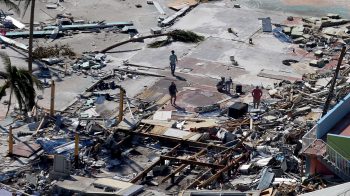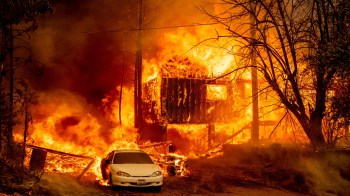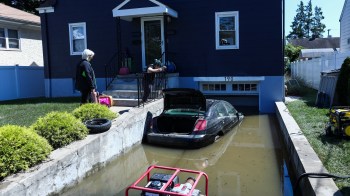
As more Floridians turn to state’s insurer of last resort, it seeks to raise rates
As more Floridians turn to state’s insurer of last resort, it seeks to raise rates

If you want to see the impact of climate change on this economy, there are lots of places to look. One is the way the heat affects businesses and workers, as many Americans are being affected this week. And, of course, there’s the rising cost of insurance.
More intense and more expensive natural disasters are driving up insurance rates in many parts of the country, forcing homeowners to turn to “insurers of last resort” backed by state governments or at the federal level.
Case in point: Citizens Property Insurance Corp., Florida’s insurer of last resort, has become the state’s largest insurer. And this week, Citizens said it will ask regulators for permission to increase its rates by about 14%.
As the insurer of last resort, Citizens is supposed to provide policies to people who can’t get insurance in the regular market. In Florida — after years of rising rates, big storms and insurers leaving the area — that’s a lot of people.
“Having 1.2 million policies is way too heavy of a risk load for Citizens. They consider a manageable level to be 400,000 to 500,000 policies,” said Mark Friedlander, director of corporate communications with the Insurance Information Institute.
While changes to state law have lured some companies back, “they’re adding 5,000 a week, or in total, approximately 200,000 new customers since October,” he said. “So the rate gap needs to be corrected so that Citizens is as close as possible to private market rates.”
Citizens, which did not respond to an interview request, is asking state regulators for almost the maximum rate hike allowed.
Mel Montagne, president of the advocacy group Fair Insurance Rates for Monroe, plans to fight the move.
For Montagne and his neighbors in Monroe County — which includes the Florida Keys — Citizens isn’t a market of last resort. “It’s pretty predominantly our only market down here for windstorm,” he said.
Montagne said a 14% rate increase will impose higher premiums on many Floridians who are already struggling to pay the bills.
“It’s incredibly expensive. You’re looking $6,000 to $8,000 on average,” he said.
Chuck Nyce, who teaches risk management and insurance at Florida State University, said there’s a lesson here. “Tornados, wildfires, earthquakes — all of these things have led to homeowners insurance being less predictable and less profitable for insurers. So rates are going up,” he said.
And it’s not just a Florida problem, Nyce said. It’s across the country.
There’s a lot happening in the world. Through it all, Marketplace is here for you.
You rely on Marketplace to break down the world’s events and tell you how it affects you in a fact-based, approachable way. We rely on your financial support to keep making that possible.
Your donation today powers the independent journalism that you rely on. For just $5/month, you can help sustain Marketplace so we can keep reporting on the things that matter to you.

















